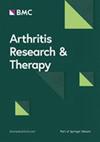针对类风湿性关节炎的致病性成纤维细胞样滑膜细胞亚群
IF 4.9
2区 医学
Q1 Medicine
引用次数: 0
摘要
成纤维细胞样滑膜细胞(FLSs)在类风湿性关节炎(RA)发病机制中起着核心作用,是类风湿性关节炎(RA)患者炎症滑膜中的主要细胞成分。成纤维细胞正在成为治疗类风湿性关节炎的新靶点。然而,成纤维细胞具有许多维持组织稳态所需的基本功能。直接靶向FLS上的一般成纤维细胞标记物具有挑战性,因为其他组织中的成纤维细胞可能会发生改变,并可能产生副作用,如伤口愈合能力下降或纤维化。迄今为止,还没有针对FLS的靶向疗法应用于RA的临床治疗。近年来,在scRNA-seq等高通量技术的帮助下,人们发现了几种RA的特异性致病FLS亚群。了解这些致病性FLS集群的特征及其分化的驱动机制,可为开发治疗RA的新型FLS靶向策略提供新的见解。在此,我们将讨论近年来已阐明的RA致病性FLS亚群以及针对致病性FLS的潜在策略。本文章由计算机程序翻译,如有差异,请以英文原文为准。
Targeting pathogenic fibroblast-like synoviocyte subsets in rheumatoid arthritis
Fibroblast-like synoviocytes (FLSs) play a central role in RA pathogenesis and are the main cellular component in the inflamed synovium of patients with rheumatoid arthritis (RA). FLSs are emerging as promising new therapeutic targets in RA. However, fibroblasts perform many essential functions that are required for sustaining tissue homeostasis. Direct targeting of general fibroblast markers on FLSs is challenging because fibroblasts in other tissues might be altered and side effects such as reduced wound healing or fibrosis can occur. To date, no FLS-specific targeted therapies have been applied in the clinical management of RA. With the help of high-throughput technologies such as scRNA-seq in recent years, several specific pathogenic FLS subsets in RA have been identified. Understanding the characteristics of these pathogenic FLS clusters and the mechanisms that drive their differentiation can provide new insights into the development of novel FLS-targeting strategies for RA. Here, we discuss the pathogenic FLS subsets in RA that have been elucidated in recent years and potential strategies for targeting pathogenic FLSs.
求助全文
通过发布文献求助,成功后即可免费获取论文全文。
去求助
来源期刊

Arthritis Research & Therapy
RHEUMATOLOGY-
CiteScore
8.60
自引率
2.00%
发文量
261
审稿时长
14 weeks
期刊介绍:
Established in 1999, Arthritis Research and Therapy is an international, open access, peer-reviewed journal, publishing original articles in the area of musculoskeletal research and therapy as well as, reviews, commentaries and reports. A major focus of the journal is on the immunologic processes leading to inflammation, damage and repair as they relate to autoimmune rheumatic and musculoskeletal conditions, and which inform the translation of this knowledge into advances in clinical care. Original basic, translational and clinical research is considered for publication along with results of early and late phase therapeutic trials, especially as they pertain to the underpinning science that informs clinical observations in interventional studies.
 求助内容:
求助内容: 应助结果提醒方式:
应助结果提醒方式:


